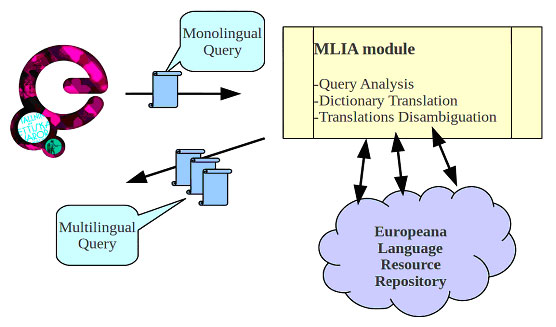|
 |
Results and resourcesMultilingualityEuropeanaConnect facilitates multilingual access to Europeana content by providing multilingual query translation as well as multilingual mapping of controlled vocabularies for browsing and searching within the Europeana Semantic Layer. Reaching this goal will allow users to submit queries in their native language and still be able to retrieve documents in other languages and make content multilingually and multiculturally usable. Objects within Europeana derive from many sources across all European countries. Through the provision of multilingual access capabilities all content can be accessed by all Europeana users equally, regardless of their native language or the available native language resources. EuropeanaConnect supports a set of 10 languages: English, French, German, Italian, Polish, Spanish (core languages), Dutch, Hungarian, Swedish and Portuguese. A summary of multilingual access strategies can be found here:
Presentations
To offer multilingual access capabilities it is essential to use resources which can help processing natural
language in machine-readable form. The Europeana Language Resources Repository collects and aggregates open-source
and licensed language resources to be used via download or direct APIs in Europeana components. These language resources
include:
Documents and Presentations
To see what resources have been selected for use in Europeana go to the Resource Register
:
Open Source language resources aggregated within the community can be found here:
Multilingual mapping of controlled vocabularies has the purpose of providing multilingual search and browsing capabilities in the Europeana portal. To merge the heterogeneous and multilingual Europeana resources, this task seeks to relate value vocabularies (thesauri, person authority lists, etc) that are relevant in the Cultural Heritage domain. The approach here is to find alignments between the local vocabularies
used to annotate the original data and more general pivot vocabularies.
Documents and Presentations
A proper software module named MultiLingual Information Access (MLIA) has been designed and included in the Language
Resource Repository. The goal of the module consists in providing query translation functionalities to the Europeana
portal in order to support Cross-Language Information Retrieval.
Documents and Presentations
The objective of this task is to give an overview over a number of projects within Europe that have dealt -
expressly or not - with multilingual access issues to their content representing their results. The main focus is on user needs and desired features for multilingual access learned in part from a thorough screening of associated Europeana user studies and results from other projects as well as from a survey targeted specifically toward multilingual access issues within Europeana. The outcome of these studies is a description of user requirements and suggested usage scenarios for three multilingual access features (query translation, result representation & multilingual subject mapping for document enrichment), which serves as a starting point for a discussion on multilingual access options in Europeana.
Testing and evaluation of the translation services and modules is fundamental for ensuring that the developed
components comply with the user requirements.
Documents and Presentations
The workshop website with all the presentations is available at:
http://www.europeanaconnect.eu/MLIA4DL09Workshop.php
Documents and Presentations
|

